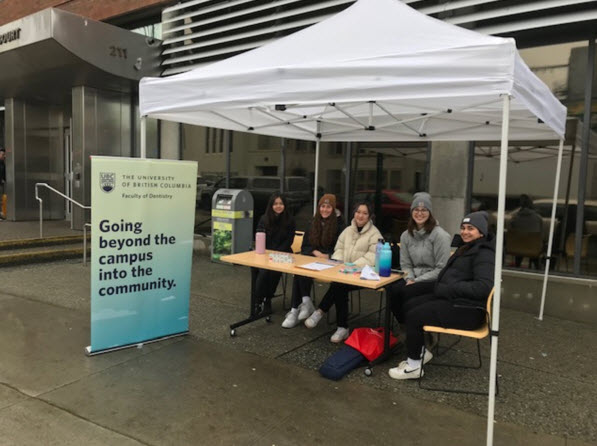From dental hygiene to housing to art, music and writing opportunities, partnerships with organizations outside the justice system play an important role in the work of Vancouver’s two specialized sentencing courts, the Downtown Community Court and the Drug Treatment Court. Involvement in activities like these help court participants rebuild their lives and avoid criminal behaviour.
In the last two years some programs had to be suspended and others were modified due to the pandemic. But with the lifting of public health restrictions in April 2022, both courts welcomed clients back for in-person courtroom appearances and program attendance. This eNews describes some of the Court’s current program partnerships and what they offer.
The Drug Treatment Court of Vancouver (DTCV)
After COVID restrictions began in March 2020, DTCV’s treatment team continued to provide a four-phased treatment program – but much of it happened virtually. As in-person court appearances, counselling, and random drug screens gradually resumed, the many programs and groups that support DTCV’s clients also welcomed in-person participation again.
Addiction can be fueled by isolation, depression, and social anxiety. So making human connections in community-driven activities is vital for individuals in recovery. DTCV’s program partnerships support recovery, address basic needs, and encourage clients to connect with others.
Some of DTCV’s current partnerships include:
- the Court’s Indigenous-led partner program, the “Talking Circle”, supporting clients in addiction and mental health virtually through Zoom
- “Mission Possible” and other employment programs like WorkBC, providing employment coaching, skills training, and future job placement after completing a six-month employment program
- specialized virtual programs on mindfulness, the benefits of Art Therapy, and individualized self-care options, created by counselling students during the pandemic (with art ‘To-Go’ kits available from the DTCV Treatment Centre)
- “Two roads to recovery” programs created and facilitated by counselling students
- free dental supplies and dental hygiene appointments in a UBC Dental Health Clinic program
- a “Drum Circle” group facilitated by a local musician and drumming teacher
- help accessing or maintaining housing, finding meaningful employment, and other life-skills offered by Connective (formerly John Howard Society)
Canada’s first Recovery Café has opened in Vancouver. In addition to meals, it offers a variety of recovery resources, programs, and supports. As part of their ongoing interest in new partnership opportunities, DTCV staff and participants have visited the café to learn more about it.

UBC Dental Hygiene Degree Program students at their information table outside Downtown Community Court on January 18, 2023
The Downtown Community Court (DCC)
With stringent health safeguards in place, the Downtown Community Court’s Case Management teams were able to provide on-site support for clients after March 2020. Many programs continued with necessary modifications. DCC’s program referrals and attendance increased after capacity limits were lifted in April 2022, and Case Management Teams were able to do more outreach work, helping clients get to appointments and attend programs.
From its inception, DCC has been a partnership of justice, social, and health care services integrated to provide timely, coordinated, and meaningful sentencing and treatment of offenders. As a community court, DCC relies on the relationships it has built with community groups and neighbourhoods to support its clients’ lifestyle changes and permit them to make reparation to the community.
Some of DCC’s current partnerships include:
- Art Therapy “Drop-in” Studio operated by Adler University (1-1 & groups)
- UBC’s Dental Hygiene program
- Music Therapy Studio operated by Capilano University Music Therapy Students
- Facilitated ‘Understanding Anger’ and ‘Conflict Resolution’ programs
- Elizabeth Fry ‘Crime and Consequences’ program
- A new program, ‘Write-On,’ provides space for clients to practice writing, both creative and journaling, and get help with apology letters to victims of crime.
- Community Kitchen, a popular program with clients, co-facilitated with DCC staff
DCC is also excited to be bringing in a new Indigenous Resource Worker through one of their non-profit partners.
With the support of Eastside Works, an inclusive lower-barrier employment agency, DCC has added “Peer roles” to some of its programs. Currently, a Peer Facilitator assists in the Art and Music Studios. Assigning program leadership responsibilities to some clients has not only helped build partnerships but strengthened clients’ connections with programs and services.
In addition, DCC’s Case Management teams continue to work actively with partners to find appropriate housing and other support for clients.
A crucial ingredient
Provincial Court Chief Judge Melissa Gillespie says, “Community partnerships are a crucial ingredient in the BC Provincial Court’s specialized courts. Integrating community programs and services with the justice system is an essential part of our efforts to address the underlying health and social problems that often lead to crime. The Court appreciates the contributions of the groups mentioned here, and of those around the province working with our other specialized courts. Working together, we are much more effective in our shared goals of rehabilitating offenders and building safe communities.”

